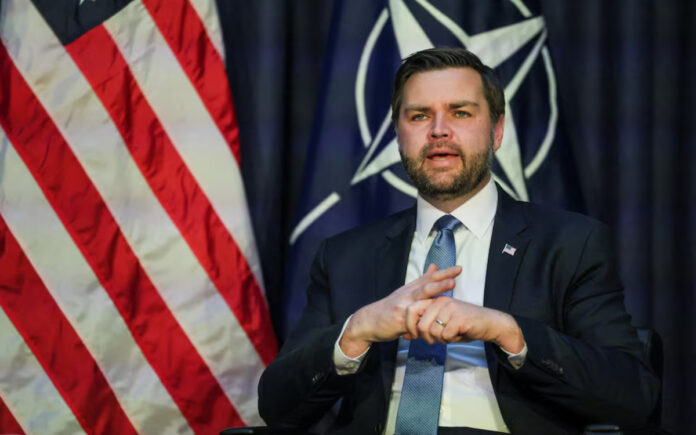Munich: U.S. Vice President JD Vance took center stage at the Munich Security Conference on Friday, launching a sharp critique of European leadership over free speech restrictions and immigration policies. His remarks triggered a strong response from German Defense Minister Boris Pistorius and shifted focus away from anticipated discussions on Ukraine and peace negotiations.
The conference, expected to prioritize potential peace talks following a call between U.S. President Donald Trump and Russian President Vladimir Putin, instead became a platform for Vance to voice concerns about what he described as Europe’s “retreat from fundamental values” and “out-of-control immigration.” He barely addressed Russia or Ukraine in his speech.
US Vice President JD Vance accused European leaders of censoring free speech and failing to control immigration, drawing a sharp rebuke from Germany's defense minister and overshadowing discussions on the war in Ukraine https://t.co/AteALg5eeK pic.twitter.com/4WN0CedXDs
— Reuters (@Reuters) February 15, 2025
German Defense Minister Fires Back
Vance’s remarks drew an immediate rebuke from Pistorius, who condemned them as “unacceptable” and accused the U.S. vice president of questioning democracy across Europe. The sharp exchange underscored the widening ideological divide between Trump’s administration and European leaders, complicating efforts to maintain transatlantic unity, particularly on Ukraine.
Attendees at the conference appeared visibly taken aback, with many watching in silence. Applause was notably scarce as Vance delivered his speech.
Meeting With AfD Leader Sparks Controversy
Following his speech, Vance met with Alice Weidel, leader of Germany’s far-right Alternative for Germany (AfD) party. The meeting, just days before Germany’s federal elections, is expected to generate backlash, given the AfD’s controversial status. The party, known for its anti-immigration stance, is under surveillance by German security services for suspected extremist ties.
Trump’s recent call with Putin has heightened European concerns about being sidelined in negotiations over Ukraine’s future. Since Russia’s 2022 invasion, European leaders have sought to isolate Putin, fearing any deal made without their involvement could undermine their security interests.
Vance’s Stance on Ukraine and NATO
Despite the tension, Vance met with Ukrainian President Volodymyr Zelenskiy in Munich. However, neither provided details on their discussions. Zelenskiy reiterated that Ukraine would engage in peace talks only after aligning with Trump and European allies on a unified strategy.
German Foreign Minister Annalena Baerbock warned against any externally imposed settlement, emphasizing that a “sham peace” would fail to ensure security for Ukraine, Europe, or the United States.
Russia, which currently occupies approximately 20% of Ukraine, has justified its invasion by citing Ukraine’s NATO aspirations as a direct threat. However, Kyiv and Western nations view Russia’s actions as an attempt to expand its territorial control.
Vance also echoed Trump’s long-standing demand that Europe take greater responsibility for its defense, allowing the U.S. to shift its focus to other regions, particularly the Indo-Pacific.
Also Read | Canadian Flag Sales Soar Amid Tensions with Trump
“In the future, we think Europe is going to have to take a bigger role in its own security,” Vance said during a meeting with German President Frank-Walter Steinmeier.
NATO Secretary General Mark Rutte agreed, acknowledging that Europe must increase its defense spending. “We have to grow up in that sense and spend much more,” Rutte stated.
Europe’s Response and Future Defense Strategy
European leaders at the conference acknowledged the need to strengthen their defense capabilities but emphasized that any transition in U.S. support should be gradual and well-coordinated.
Prior to his meeting with Weidel, Vance appeared to suggest that the AfD could be considered a legitimate political partner, challenging the stance of Germany’s major political parties, which have consistently refused to collaborate with the far-right group.
Also Read | Saudi-Led Initiative Seeks Palestinian Statehood Amid Gaza Crisis
Adding to the controversy, billionaire Elon Musk—Trump’s largest campaign donor and the head of a newly formed task force to reduce U.S. government spending—has also publicly backed the AfD. The party is currently polling at around 20% ahead of Germany’s general election on February 23.
Vance’s speech and actions in Munich have reinforced concerns among European leaders about the direction of U.S. foreign policy under the Trump administration, particularly in relation to NATO and support for Ukraine.



